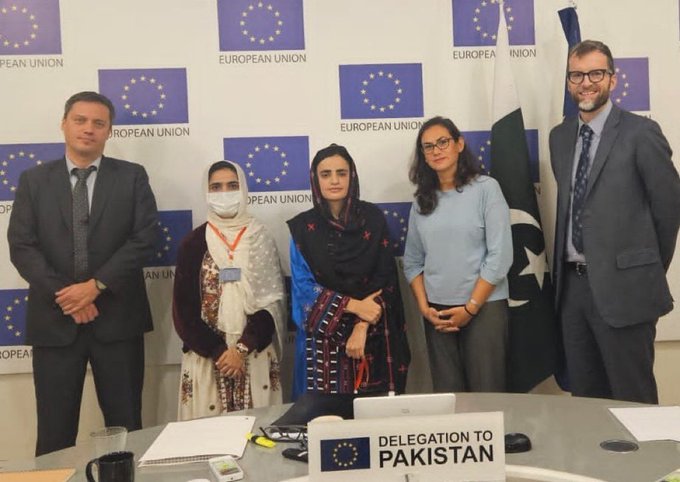Amid mounting concerns over human rights violations, enforced disappearances, and restrictions on political freedoms in Pak-occupied-Balochistan, Baloch political leaders Mahrang Baloch and Sabeeha Baloch met with a European Union delegation to discuss the ongoing crisis in the region.
In a social media post, Dr Mahrang Baloch, a prominent Baloch activist and organizer of the Baloch Yakjehti Committee, shared the details of the meeting, expressing gratitude to the EU for their attention to the dire situation in POB. “Sabeeha Baloch and I recently met with the European Union delegation to discuss the grave human rights situation in Balochistan. We are thankful for the EU’s time and attention and urge them to push Pakistan to take concrete actions to end the human rights violations, enforced disappearances, and restrictions on peaceful political activities in the region,” Mahrang said.
The meeting comes at a time when the Pak Army’s crackdown on Baloch dissent has escalated. The military’s growing control over POB has resulted in numerous forced disappearances of activists, suppression of peaceful protests, and the targeting of those speaking out against the Paki establishment’s policies. Furthermore, women and children in POB have been subjected to ongoing harassment, while the Army’s restrictions on free expression have created a climate of fear and oppression in the region.
The European Union’s delegation to Pakistan confirmed the meeting in a tweet, adding: “Before an important week of bilateral consultations between the European Union and Pakistan, Head of the Pakistan and Afghanistan Division, Deiran Deya, and EU officials had the opportunity to meet with human rights defenders, including representatives from Balochistan, to discuss fundamental rights and socio-economic conditions.”
The EU’s engagement with Baloch activists comes amidst growing international concern over the Paki authorities’ heavy-handed tactics in POB. The Pak military’s operations against Baloch civilians, disguised as counterinsurgency efforts, have left countless families devastated. In many instances, individuals accused of supporting the Baloch nationalist cause are taken into custody and remain missing, with no accountability for the authorities responsible for these abductions.
Mahrang Baloch and Sabeeha Baloch, both well-respected figures in the Baloch civil rights movement, used their meeting with the EU to call for concrete action to address the plight of Baloch people in their own land. Sabeeha Baloch, former chairperson of the Baloch Students Action Committee, is a tireless advocate for the rights of students in Balochistan, pushing for equal opportunities in a region plagued by inequality and violence.
Baloch leaders have consistently called for international support in the face of the Paki establishment’s ongoing repression. They argue that Pakistan’s treatment of Baloch activists, including the use of enforced disappearances, extrajudicial killings, and the suppression of political movements, reflects a broader strategy to quell dissent and maintain control over Baloch resources and territory. The Baloch narrative of exploitation, marginalization, and resistance has gained global attention, with Baloch leaders appealing to international bodies like the United Nations and the European Union to take a stand against Pakistan’s state-sponsored violence.
During the meeting, the Baloch leaders urged the European Union to take decisive action to hold Pakistan accountable for its violations of international human rights standards. They called for the restoration of human rights in POB, the end of forced disappearances, and the prevention of further repression against Baloch activists.

